When people ask me to name my game of the decade, I pause. There are so many. I took away hard-won lessons from some of them, but over time, I’ve come to realize that those lessons were probably wrong.
On a more or less annual basis, my game of the decade changes. This is not just because several thousand boatloads of new games come out each year, but because my relationship to video games as a medium changes, too. What I want out of them, the space they occupy in my life, evolves over time.
A decade is a lot of time. For a large chunk of the one that just passed (press F), I used games as a mirror—a means of checking myself while, more often than not, wrecking myself. I struggled with depression, a lack of concrete bonds in my life, and generalized angst that goes hand-in-hand with growing from a young adult into a regular adult (during the dystopian future), and I thought, on some subconscious level, that powerful experiences I had in video games could translate into real-life turning points.
Ten years later, I still believe that people’s approaches to games can serve as reflections of where they’re at, but I’m wary of identifying too strongly with them. Whether the struggle is intergalactic or interpersonal, games have a way of wrapping things up neatly. Real life is much messier.
Thus, it only feels right to chronicle all the games from this decade that were my game of the decade until they stopped being my game of the decade because a different game became my game of the decade. Simple enough, right? Let’s begin.
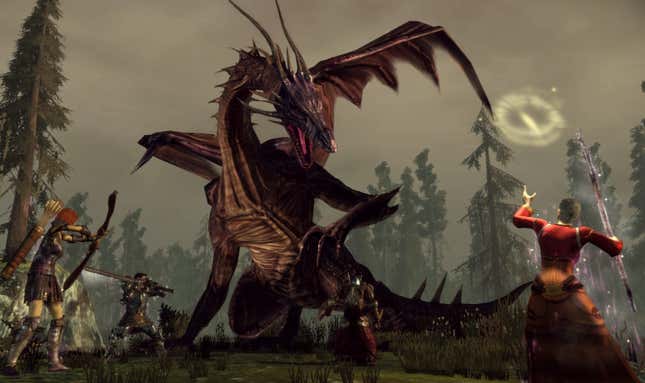
2010 — Dragon Age: Origins
Why it was my game of the decade: The first entry in BioWare’s Darkspawn-decapitating fantasy series came out at the tail end of 2009, but my obsession with it lasted well into 2010—in part thanks to the Awakening expansion, which came out that year. At the time, I was still in college, with a burgeoning freelance career on the side. Maximum PC magazine put me on review duty for the main game, but even during my week-long marathon play session, I hunted for ways to extend its run time.
I adored its menagerie of scrappy companions, both for the low fantasy flavor they brought to a high fantasy world and for their awful, horrible, terrible taste in hats. I wanted to spend as much time with them as possible, especially Leliana, who I romanced because she reminded me of the person I was dating IRL at the time. As someone who’d largely grown up on JRPGs, this was the first time I felt so strongly about the cast of a role-playing game from Mine Own Shores (or Canada’s own shores, as it were). It was a new horizon for me.
Why it isn’t anymore: I sort of fell out of love with Dragon Age, as a series, over time. While I appreciate what Dragon Age II tried to do in terms of centering a story around a location, it didn’t really land for me when it first came out. As for Inquisition, I still haven’t finished it. It struck me as fine, but it never really sank its hooks into me like Origins did.
In addition, I have realized with the benefit of hindsight that, somewhat embarrassingly, a disproportionate amount of my feelings about Dragon Age were tied up in the IRL relationship I was in while playing it. The person I was dating was very religious, much like Leliana, and that relationship wound up ending so disastrously that it functioned as a dying gasp of my religious upbringing. While none of these directly reflect on Dragon Age: Origins’ intrinsic quality as a game—an intangible metric that’s impossible to quantify, despite the tireless efforts of game rankers across websites ranging from Reddit to a different part of Reddit—they weakened my connection to it. Origins will always be an important game to me, but these days it’s a drop in a much larger bucket.
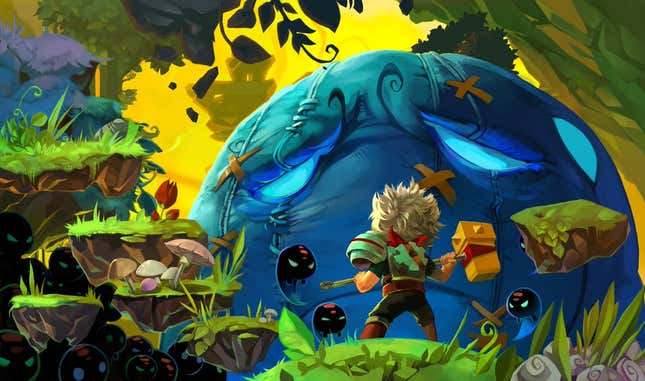
2011 — Bastion
Why it was my game of the decade: When I first played Bastion, it just felt different. The art, music, and use of voiced narration were unlike anything else I’d ever experienced in a game. The sheer cohesion of it all knocked me flat. The story unfurled in such a way as to retroactively validate just about any reading of it you could conjure up, and coming off games that were more straightforwardly black and white like Dragon Age, BioShock, Knights of the Old Republic, and Mass Effect, that really did a number on me.
At the time, I wrote a big, self-indulgent piece about how, depending on your choices in a couple crucial moments, even tiles rising up to meet your footfalls could be read as evidence of either dogged attachment to a flawed and oppressive but salvageable past or an endless trudge into an unknown future. That, I thought at the time, is what video game stories could be, would become, if they just embraced a bit more restraint.
Why it isn’t anymore: Bastion is still a good video game, but it’s been surpassed by developer Supergiant’s own later works, among many others. And while its narrative remains unique in its structure, I feel like other games have since tackled its themes with more nuance. Heck, some have even used narrative voiceover in better ways. In hindsight, Bastion was a starting point in multiple ways; it got me to think more critically about games, and it inspired a multitude of later efforts that might just have beaten it at its own game. It felt revolutionary for its time, but time caught up.
Also, this is neither here nor there, but today while searching for the aforementioned piece I wrote about the game, I discovered that it’s been taken offline and is now only accessible through janky internet archives. Given that Bastion is, in some ways, a game about the perils of forgetting the past, that puts a kind of grim coda on things, huh?
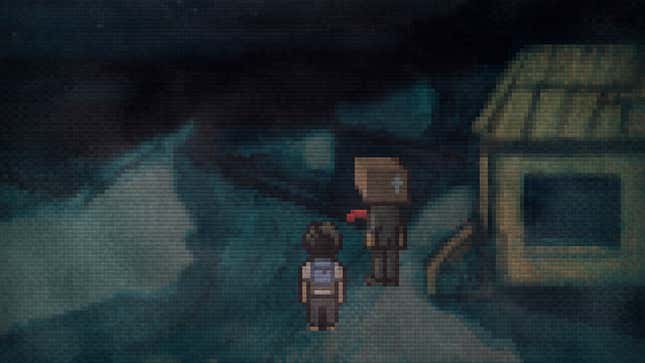
2012 — Lone Survivor
Why it was my game of the decade: Lone Survivor was that rare game that came along just when I needed it most. I played the distinctly Lynchian side-scrolling take on Silent Hill-style psychological horror shortly after moving to San Francisco and falling into an ugly bout of depression.
Initially, I hated it. I kept encountering frustrating setbacks, and the main character would repeatedly complain about how much of a mess he was. I got mad at him, but in doing so, I had the revelatory (for a 22-year-old) realization that I was actually mad at myself for being depressed. In a stunning turn, the game proceeded to mirror my own progression after I decided to cut myself some slack.
I wrote about it at the end of that year:
“I stuck with Lone Survivor. After my lowest, cursing-est, spitting-est point, I had nowhere to go but up. What really hit home for me, though, was how my character reacted once I finally got my act together. Slowly but surely, his disposition became more cheerful. He pointed out how well-rested he felt, how much he enjoyed his daily coffee, how wonderful it was to simply scarf down a warm meal. It wasn’t just about survival anymore. He’d remember how much he loved living. So he ventured further and further out. He adopted a helpless stray cat. He did his damndest to save some poor man from transforming into a gurgling wad of screaming flesh. And eventually, he confronted the source of all his suffering and guilt head-on.”
Why it isn’t anymore: Of all the games on this list, Lone Survivor might be closest to being the game of the decade for me. It helped me confront some seriously gnarly self-loathing and, for better or worse, changed the way I approached games in the aftermath. For the next handful of years, I sought similarly transformative experiences from other games because I figured that if one could do it, so could others—and maybe, if they did, that would make my time with them more valid, more worthwhile. Looking back on that period, though, I also had a lot of growing up to do, and trying to find a quick fix to a lifelong issue in what is ultimately an entertainment medium might not have been the greatest idea.
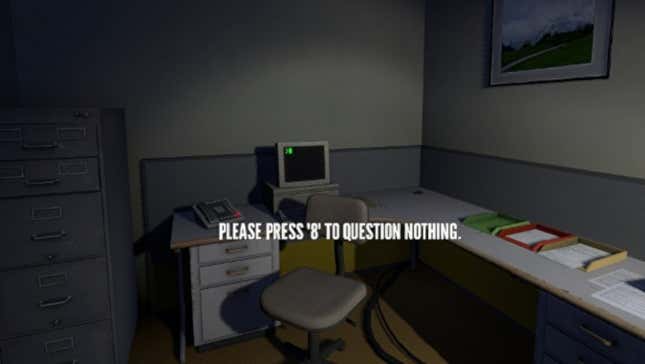
2013 — The Stanley Parable
Why it was my game of the decade: When I first played it, The Stanley Parable broke my brain. It was so gleefully packed with meta twists and meta-meta twists and meta-meta-meta twists. Every step off the beaten path revealed another, equally beaten path that was nonetheless meant to feel like a forbidden zone, a little secret that only you and the game shared.
The Stanley Parable told jokes. The Stanley Parable questioned what it meant to exist and tell stories. The Stanley Parable did about a million other things in between. It was indulgently excessive, a maximalist approach to poking fun at video games and the drudgery of modern life and countless other things. It felt subversive, an embodiment of video game and internet culture’s trope-obsessed past as well as their burgeoning existential dread-driven future. I played the bulk of the game in one sitting, and when I’d completed every path I could find, I remember thinking “I’m not exactly sure what that game was trying to say, but I know it said something.”
Why it isn’t anymore: For the reasons I outlined above, The Stanley Parable now feels to me like a time capsule. The tone of its humor was deeply prescient, given that the punchline of every joke on the internet is now “What even is life anymore, oh well, we’re all going to die soon.” But there’s a desperation to its cleverness that no longer speaks to me. Back then, I think I felt a kinship with the game’s winking excess. “Look at me,” I basically said by writing a gargantuan, multi-part review of the game at the time. “Look at how clever I am, too.”
I don’t think it’s wrong or otherwise invalid to seek attention in that way. I think many people go through that phase at some point or another, some more than others. But, for me at least, being That Guy—and especially trying to be That Guy online—ultimately became more about feeding my ego empty calories than finding sustainable routes to honest, healthy self-expression.
These days, I feel pretty distant from The Stanley Parable, but I still appreciate its intelligence and, in its best moments, earnestness, as well as what it did for me at the time. I’m excited to see how time and experience have changed the perspectives of its creators too, given that they’re now working on The Stanley Parable: Ultra Deluxe. Seven years later, they have more to say.

2014 — Uhhh... Books?
Why it was my game of the decade: 2014 was not a great year my general enjoyment of video games. Certainly, I played plenty of very good games that year—Transistor, Sunless Sea, Shadow of Mordor, and Shadowrun: Dragonfall, as well as highlights from the previous year like Call of Juarez: Gunslinger, Saints Row IV, and Kentucky Route Zero. But 2014 was also the year Gamergate happened, and the whole event left me worn out, dispirited, and directionless. I didn’t have to deal with as much as many women who were impacted, and it didn’t sap me of my love for games, but at least for a time, the medium stopped feeling like a refuge. By the end of the year, I needed a break. I got a lot of reading done, though.
Why it isn’t anymore: I still like books. I have, however, just been informed that they’re not video games, so they’re disqualified.
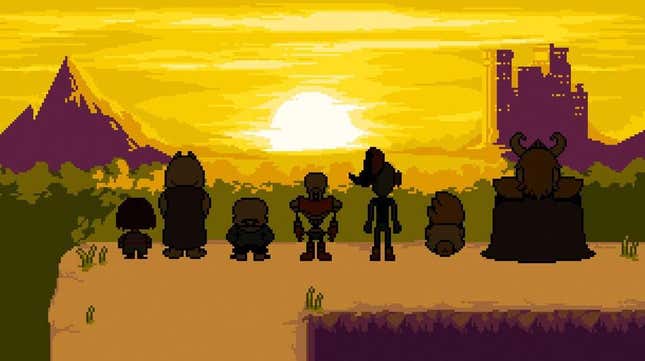
2015 — Undertale
Why it was my game of the decade: Undertale was another game that felt like it was reaching out a friendly, supportive hand to me during a trying time. I’d once again retreated inward after moving to a new part of a city that never really felt like home in the first place, and I began to grapple with the fact that—as a dude who lived alone and worked from home—I’d never really learned how to make friends or form lasting bonds with people.
Undertale exuded warmth. Many of its characters started out their arcs lonely and awkward, on wavelengths that didn’t mesh with those of anybody around them. But, if your character reached out and made connections with them, they let their walls down and connected with each other, too. They formed a community—and a community, in turn, formed around Undertale. A big one. This weird little game about outcasts who believed themselves unlovable took over video games in the span of a few months. It was truly wild to see, but I was only kind of surprised when it happened. Undertale provided me with motivation—determination, even—to seek out a community of my own. It was, in that regard and many others, a truly powerful game. Works like that have a way of transcending their origins.
Why it isn’t anymore: Undertale remains a truly magnificent game. I recommend it to just about everybody I meet who claims to possess even a cursory interest in video games. But I think it also serves as a cautionary tale.
First, on a personal level: After I finished Undertale and wrote my long, triumphant review, I really believed I was going to get out there and drag some folks kicking and screaming into meaningful, supportive friendships. But that didn’t really end up happening. Even once I started introducing myself to more people, I struggled with the followthrough. It was hard to figure out when to text people or how many times we needed to hang out before it was chill to invite them to my apartment or, most importantly, what it meant to really communicate feelings, fears, and all that other intrinsically human stuff.
This should not have come as a shock to me, but you can’t learn how to make friends from a story-driven single-player video game, even a transcendentally good one. You’ve got to be willing to make yourself vulnerable, and I failed to take that step. Moreover, I was fickle and flighty, always seeking out the next shiny new person or thing. I was kind of a jerk, even as I repeatedly told myself that I was a cool, nice guy who deserved more community than he had. But Undertale still felt deeply tied to my identity, like a part of me that I needed to keep living out and that justified my actions.
Clinging to any game with such ferocity, even one as wholesome as Undertale, causes problems. It did so for my self-perception, and eventually, in a different way, it damaged Undertale’s community, too. Molded by an increasingly algorithmic, content-ravenous internet, large portions of the community eventually turned possessive and toxic, berating people for not playing the game the “right” way or coming away from it with the correct takeaways. They chose to act out their personal attachments to the game differently than me, but in ways that probably were not good for them, either.
This is not to discredit the powerful experiences people have had while playing games, nor is it to say that people should avoid identifying with them on a personal level. The Undertale community has produced incredible fan works and united a lot of people from a variety of backgrounds, some of whom probably wouldn’t have felt like they had a voice in games otherwise. But increasingly, I feel like it’s rarely healthy to regard a piece of media as a central part of your identity. I think with Undertale, I learned that the hard way.
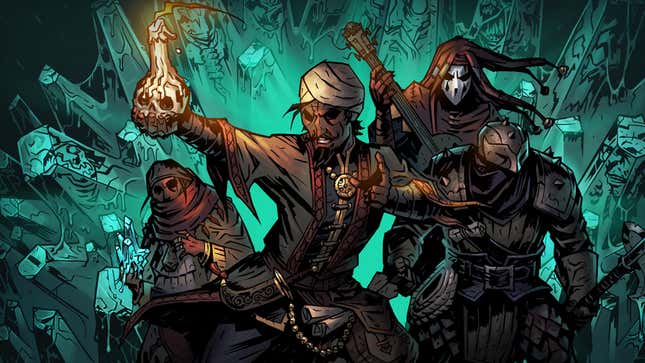
2016 — Darkest Dungeon
Why it was my game of the decade: I mean, first of all, Darkest Dungeon is just a design masterclass. An iron maiden that continually clamps its jaws tighter and tighter the more you struggle, it is nonetheless a game that compels you to plumb every last inch of its nightmarish depths. But it also forced me to grapple with ideas I’d quietly held myself to for my entire life: that personal progress is linear and there is no room to fall backward from peaks into valleys of your own making.
When I first started playing Darkest Dungeon, I repeatedly pushed my characters until they broke, irreparably afflicted with depression and disease. I stopped progressing. I was furious. Much like with Lone Survivor, though, I found that I was mirroring a similar IRL pattern in the game, pushing myself past a point where it was even remotely practical and then berating myself for failing to live up to impossible standards.
In real life, I was still grappling with damage done by lingering physical health issues and the mental toll of Gamergate. In the game, I was running my characters ragged without giving them time and resources to recover. I had to acknowledge those things. I had to accept temporary failure in order to succeed.
Why it isn’t anymore: At the time, I believed that was that, and I wrote a piece that more or less said as much. I’d had another transformative experience with a game. I’d learned my lesson. Except I hadn’t. Not really. I began performatively practicing certain elements of self-care in my own life, but I still pushed myself in others. I sought out therapy, but I didn’t stick with it for long. It wasn’t until this year that I resumed therapy in earnest. I still haven’t resolved my physical health issues. They have gotten worse over time.
I think I was overly eager to put a bow on things with Darkest Dungeon—to tell a nice story about myself rather than a truer, uglier one—so that I could forge a nice, neat, narratively compelling bond with it. We exist in a culture that exerts a constant, invisible pressure on us to let the media we consume define us. Then we can broadcast that to others, provide them with a shorthand for what we’re about. But there’s a danger to buying into your own story, and for me, it’s been easy to use video games to help tell that story. To reinforce it. To make it canon. At the time, I really believed what I was saying about my experience with Darkest Dungeon—and many other games besides. Even so, in hindsight, I think I was doing myself a disservice. Maybe this is just what it means to learn and grow over time. Still, I wish I’d learned sooner.
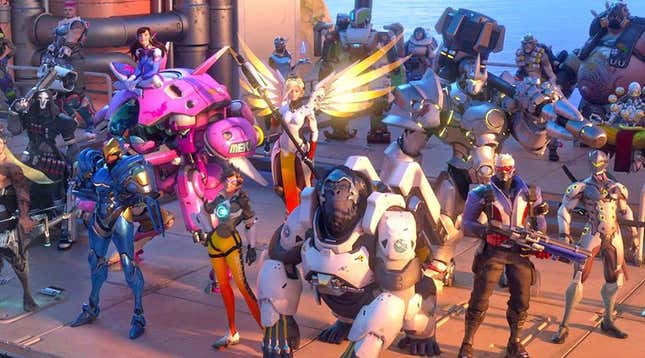
2017-2019 — Overwatch
Why it was my game of the decade: When Overwatch first came out in 2016, it was everything. A competitive multiplayer game I finally liked. A big-budget mega-production intent on representing people from across the globe, doing justice to countries and cultures repeatedly ignored by video games at large. A community free of the toxic baggage lugged around by other multiplayer hits like League of Legends, Dota 2, and Counter-Strike.
It extremely did not turn out to be that last thing due to a remarkable lack of preparedness on Blizzard’s part, but I still fell in love with Overwatch’s ever-expanding roster of apes and hamsters, as well as a core gameplay loop that was built to last and coated in that special Blizzard spit ‘n’ shine. For a couple years after its release, it was my game of the year by default. I played it regularly. I wrote about it weekly. I watched nearly every Overwatch League match. Overwatch was a monolith. It was undeniable.
Why it isn’t anymore: I fell off Overwatch this year, and I fell off hard. When matches are competitive and you’re winning, it’s a high that few games can match. When your team doesn’t want to cooperate and you’re getting rolled, it’s uniquely infuriating. I can’t think of a single game that’s caused me to spew more apartment-rattling profanity than Overwatch.
In some ways, Overwatch is better now than it’s ever been, but it’s still Overwatch. On top of that, it’s failed to deliver on much of the promise it exhibited early on. It debuted with a vibrant future world full of diverse characters and infinite possibilities. Three years on, it basically hasn’t moved its story forward at all, something that is apparently being saved for the recently-announced sequel. Many of its heroes are thin stereotypes, empty gestures at the lucrative idea of diversity rather than fleshed-out characters who do justice to their inspirations—if they’re in the game at all. Overwatch 2 may yet be able to suck me back in, but it’s going to take some seriously game-changing additions at this point.
Hindsight is 2020
So, what’s my current game of the decade? In truth, I have no clue. I tricked you into reading all of these words (or just immediately scrolling to the bottom of the page) for no payoff. I am history’s greatest villain, and you are a clown.
In seriousness, though, I do not have one. I used to measure my own personal attachment to games based on the ways I thought they facilitated growth or change in me, but I don’t feel comfortable doing that anymore. Upon reevaluating my own actions and decisions, I cannot credibly say that games spurred all that much actual change. I just let myself believe they did. I wanted to believe that, during an era in which people increasingly used media to define themselves, it was possible to do so in a healthy way—one centered on challenging assumptions, preconceived notions, and habits.
Ultimately, though, I don’t feel like I was successful. Games—like books, TV, and anything else—are thin threads in the tapestries we weave until we unceremoniously drop dead; they can’t be a be-all, end-all. I look forward to figuring out everything they can be in the coming years.
